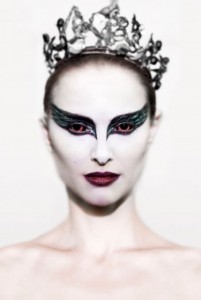SPOILERZ below


1. As I understand it, The Black Swan is a kind of parable about the relationship between art and the uncontrollable, dark aspects of human nature. That is, one must have access to the latter in order to produce the former. This is a more-than-worked-over trope in art and film, but more importantly it’s a central theme of at least one of Aronofsky’s other films: Pi (1998), which is also his first. Both feature central characters, brilliant in their fields (math in Pi, ballet in The Black Swan), whose obsessions with their work brings them close to transcendent achievement and death or madness. The difference is the ending: Pi features its hero, Max, eventually abandoning his work after it becomes too dangerous to continue. Nina, the dancer in The Black Swan, endures her plunge into madness in order to give one great performance in the lead role of Swan Lake before, it’s implied, dying by her own hand at the performance’s conclusion. Thus in Pi, by far the better film, Max “chooses life,” as it were, while the look on Nina’s face at fadeout tells us the “perfection” she’s attained also brings her life to a close.
1.1. Another conspicuous similarity. In Pi, Max is plagued by migraine headaches that approach when he works too hard. In The Black Swan, it’s implied that Nina’s mother suffers from some variation of bipolar disorder or manic depression (obsessive behavior [she paints dozens of pictures of her daughter’s face], a brief glimpse of her crying alone in her room, lightning-quick mood swings from effusion to despair) which, we are led to infer, Nina may have inherited. I’m suspicious, then: whereas Max’s migraines (the first of which was spurred by staring too long into the sun as a child, which presages the Icarus/Daedalus relationship he has with mentor Sol [like wise King Solomon but also the sun]) impair him, serve as a blockage to his genius, or an indicator that he’s gone too far, Nina’s breakdown is inseparable from her achievement as a dancer. Discipline, precision, and perfectionism are at the root of her talent while mental illness is the source of her brilliance.
1.1.1. Let’s also note that some of the ways in which Aronofsky represents “the black swan,” the dark side of Nina’s artistry, are shudder inducing, and not in a good way. The film is rife with mirrors, people looking in mirrors, reflections acting in an unruly manner, people punching mirrors, and so on. Lots of mirrors. Part of this simply derives from the setting, dance studios having lots of mirrors, after all. But come on: this is what it’s come to?
1.1.1.1 “I’ve chosen the motif of broken mirrors to show my protagonist’s fragmented self,” says Donald Kaufman in Adaptation. Which tells you something.
1.1.2. Brilliance as pathology, artistry as illness, and so on. The metaphorical world of the film seems like an excuse for its own failings.
2. A movie disguising itself as art by being about art.
2.1. Or as Jessica Suarez more elegantly phrased it, “basically bi-curious Fight Club.”
2.2. Or as Vulture phrased it, an “Art-House version of Showgirls,” though that’s meant as a compliment.

December 29, 2010 at 7:02 pm
I like your article; but other than excessive mirrors, I’m not really sure why you disliked Black Swan. Whatever your feelings are about the art/madness conundrum; Natalie Portman, another means to look at Mila Kunis, and the train scene with the old pervert are 3 reasons to at least enjoy the film. I also think the trendiness of pissing on Swan is a testament to its greatness.
Also, it’s odd that Ms. Suarez compares this movie to Fight Club, which is gayer than Richard Simmons. If Swan is bi does that make Fight Club straight? (Anecdote: in college I took an English class about war, which for the gay professor was an excuse to spend 2 classes watching Brad Pitt and Meatloaf.)
And nice Adaptation quote. Nic Cage’s last decent movie before he spent 9 years (and counting) trying to set a record for the longest streak of abysmal movies.
January 8, 2011 at 8:15 pm
Thanks for the comment. Basically I didn’t like The Black Swan because I didn’t like The Black Swan. Really, on paper, it seems like it should work. But in practice, I found many dramatic moments laughable, inspiring cringes more than anything. I guess I’m just trying to think through my own gut-level reaction, which was overwhelmingly negative.
And how is pissing on something a tribute to its greatness. True, some great works of art are misunderstood in their time, but also some things that get pissed on deserve to get pissed on. If widespread criticism is the criterion for greatness, then Gigli is my generation’s Citizen Kane.
I don’t think Jessica’s comment was meant to be analyzed that deeply – it’s a joke man. Fight Club is a great movie, so right there the analogy breaks down.